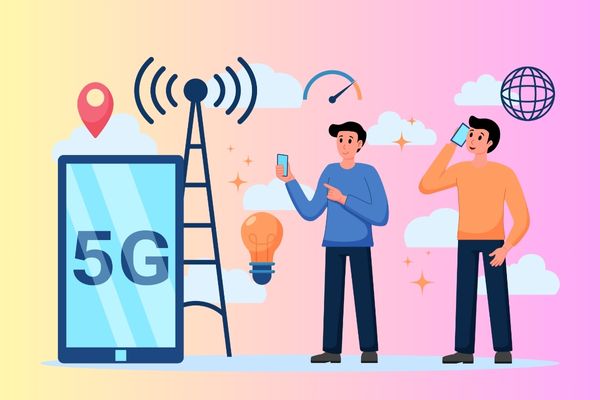5 Acts Prohibited in Telecommunications Activities from July 01, 2024? What are the Rights and Obligations of Telecommunications Enterprises?
05 Prohibited Acts in Telecommunications Activities Starting From July 1, 2024
Based on Article 9 of the Telecommunications Law 2023, the following 05 acts are prohibited in telecommunications activities:
- Abusing telecommunications activities to oppose the Socialist Republic of Vietnam; infringing upon national security, public order, and social safety, causing damage to the interests of the State, and the legitimate rights and interests of organizations and individuals.
- Illegally gathering, eavesdropping, or watching information on the telecommunications network; stealing and unauthorized use of telecommunications resources, passwords, encryption keys, and private information of other organizations and individuals.
- Illegally obstructing the establishment of telecommunications infrastructure, disturbing or sabotaging the establishment of telecommunications infrastructure, the lawful provision and use of telecommunications services.
- Establishing telecommunications infrastructure and providing telecommunications services without permission according to the regulations of this Law.
- Using devices and software to send, transmit, or receive information over the telecommunications network to commit acts violating the law.

05 prohibited acts in telecommunications activities from July 1, 2024? What are the rights and obligations of telecommunications enterprises?
What Are the Rights and Obligations of Telecommunications Enterprises?
Based on the provisions of Article 13 of the Telecommunications Law 2023, telecommunications enterprises have the following rights and obligations:
(1) For enterprises providing services without network infrastructure:
Rights:
- Building, installing, and owning a telecommunications equipment system and transmission lines within their premises and public service points to provide telecommunications services to telecommunications service users;
- Leasing transmission lines to connect telecommunications equipment systems, their premises, and public service points with each other and with the public telecommunications network of other telecommunications enterprises;
- Leasing transmission lines or buying traffic, telecommunications services from other telecommunications enterprises to resell to telecommunications service users;
- Subleasing the telecommunications infrastructure they have leased if agreed upon by the telecommunications infrastructure lessor;
- Allocated telecommunications resources according to the regulations of this Law on the management of telecommunications resources;
- Researching, developing, and testing new technologies and models in telecommunications activities;
- Other rights as stipulated by the Law on Enterprises and other related laws.
Obligations:
- Contributing financially to the Vietnam Public Utility Telecommunications Service Fund as prescribed by law;
- Responsible for service quality according to registered or announced standards; ensuring the correctness, completeness, and accuracy of the service price as per the provision and use contract of telecommunications services;
- Subject to state control and implementing regulations on ensuring the safety of telecommunications infrastructure and information security;
- Periodically or unexpectedly reporting on the telecommunications activities of the enterprise as prescribed by the Minister of Information and Communications; responsible for the accuracy and promptness of report contents and data;
- Implementing measures to prevent connections, Internet addresses, domain names, and other preventive measures against telecommunications equipment systems, telecommunications services, telecommunications application services used to perform the acts stipulated in Clause 1, Article 9 of the Telecommunications Law 2023 when required in writing by the competent state agency as prescribed by law;
- Having a plan ready for technical connections to serve electronic data reporting in response to state management requirements on telecommunications as prescribed by the Minister of Information and Communications;
- Fulfilling the demands of competent state agencies on mobilizing part or all of the telecommunications infrastructure, telecommunications services in emergencies as stipulated by laws on national defense, national security, and state of emergency;
- Ensuring that telecommunications subscribers retain their telephone numbers when switching telecommunications service providers of the same type of telecommunications service;
- Providing services to telecommunications service users with subscriber information that is complete and matches identification documents presented upon contract signing as prescribed by law;
- Authenticating, retaining, using subscriber information, and handling SIMs with incomplete or incorrect subscriber information;
- Preventing and controlling illegal messages and calls as prescribed by the Government of Vietnam;
- Terminating telecommunications services for subscribers that violate telecommunications laws;
- Other obligations as stipulated by the Law on Enterprises 2020 and other related legal regulations.
(2) Enterprises providing services with network infrastructure:
Rights:
- All rights applicable to enterprises providing services without network infrastructure;
- Priority utilization of space, land, underground, riverbeds, seabeds, and land used for public purposes to build telecommunications infrastructure according to planning, standards, technical regulations, and related laws;
- Leasing telecommunications infrastructure to other telecommunications enterprises;
- Participating in providing universal telecommunications services.
Obligations:
- All obligations applicable to enterprises providing services without network infrastructure;
- Leasing passive telecommunications technical infrastructure to other telecommunications enterprises when compliant with the telecommunications technical infrastructure planning and economically and technically feasible;
- Recalling and dismantling telecommunications works under their ownership or management that show signs of danger or do not ensure safety for operation and use as prescribed by construction laws;
- Undergrounding or reorganizing telecommunications cables.
Do Telecommunications Service Providers Need a Telecommunications Business License?
Pursuant to Clause 1, Article 20 of the Telecommunications Law 2023, the regulation is as follows:
Providing Telecommunications Services
1. Telecommunications service providers must have a telecommunications business license or register, notify the provision of telecommunications services, except in the cases stipulated in Article 42 of this Law.
Thus, according to the above regulation, telecommunications service providers must either have a telecommunications business license or register and notify the provision of telecommunications services, except in the following cases where organizations and individuals in telecommunications activities are exempt from licensing, registration, and notification:
- Trading telecommunications goods;
- Providing telecommunications services in the form of telecommunications service agents;
- Leasing transmission lines to provide telecommunications application services;
- Private telecommunications networks where network members belong to the same organization and do not establish their own telecommunications transmission lines.
The Telecommunications Law 2023 takes effect from July 1, 2024, except for cases stipulated in Clauses 3 and 4, Article 72 of the Telecommunications Law 2023.
LawNet